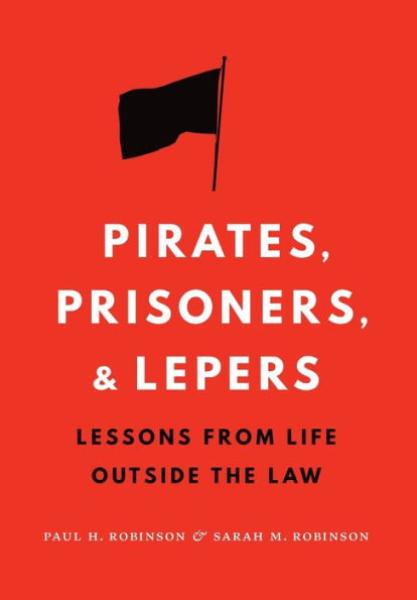Description
It has long been held that humans need government to impose social order on a chaotic, dangerous world. How, then, did early humans survive on the Serengeti Plain, surrounded by faster, stronger, and bigger predators in a harsh and forbidding environment? Pirates, Prisoners, and Lepers examines an array of natural experiments and accidents of human history to explore the fundamental nature of how human beings act when beyond the scope of the law. Pirates of the 1700s, the leper colony on Molokai Island, prisoners of the Nazis, hippie communes of the 1970s, shipwreck and plane crash survivors, and many more diverse groups--they all existed in the absence of formal rules, punishments, and hierarchies. Paul and Sarah Robinson draw on these real-life stories to suggest that humans are predisposed to be cooperative, within limits.
What these "communities" did and how they managed have dramatic implications for shaping our modern institutions. Should today's criminal justice system build on people's shared intuitions about justice? Or are we better off acknowledging this aspect of human nature but using law to temper it? Knowing the true nature of our human character and our innate ideas about justice offers a roadmap to a better society.
"It has long been held that humans need government to impose social order on a chaotic, dangerous world. How, then, did early humans survive on the Serengeti Plain, surrounded by faster, stronger, and bigger predators in a harsh and forbidding environment? Pirates, Prisoners, and Lepers examines an array of natural experiments and accidents of human history to explore the fundamental nature of how human beings act when beyond the scope of the law. Pirates of the 1700s, the leper colony on Molokai Island, prisoners of the Nazis, hippie communes of the 1970s, shipwreck and plane crash survivors, and many more diverse groups--all existed in the absence of formal rules, punishments, and hierarchies. Paul and Sarah Robinson draw on these real-life stories to suggest that humans are predisposed to be cooperative within limits. What these "communities" did and how they managed have dramatic implications for shaping our modern institutions. Should today's criminal justice system build on people's shared intuitions about justice? Or are we better off acknowledging this aspect of human nature but using law to temper it? Knowing the true nature of our human character and our innate ideas about justice offers a roadmap to a better society. "--
Paul H. Robinson is Colin S. Diver Professor of Law at the University of Pennsylvania and one of the world's leading criminal law scholars. A prolific writer and lecturer, he is the lead editor of Criminal Law Conversations and the author of Intuitions of Justice and the Utility of Desert, among other books.
Sarah M. Robinson is a former sergeant in the U.S. Army and a practiced social worker. She currently works as an author and researcher.
"Fun, fascinating, and full of insight: Pirates, Prisoners, and Lepers will make you reconsider what you think you know about government and its relationship to social order."--Peter T. Leeson, author of Anarchy Unbound and Duncan Black Professor of Economics and Law at George Mason University --Peter T. Leeson (1/6/2015 12:00:00 AM)
"Hobbes said a society without punishment would be a jungle. Some modern day academics have suggested it would prove to be a paradise, if we would only give it a chance. Who is right? Both and neither, as Paul and Sarah Robinson show with the help of some extraordinary, insufficiently appreciated 'natural experiments.'. . . Here we learn how justice emerges from nature red in tooth and claw."--Leo Katz, author of Why the Law Is So Perverse and Frank Carano Professor of Law at the University of Pennsylvania --Leo Katz (12/1/2014 12:00:00 AM)
"I've been a fan of Paul Robinson's writings on criminal justice for many decades. This book brings his brilliant scholarship to a wider audience in the context of criminal justice issues that affect us all."--Alan Dershowitz, author of Taking the Stand: My Life in the Law and professor emeritus of law at Harvard University --Alan Dershowitz (1/6/2015 12:00:00 AM)
"Paul Robinson, perhaps the nation's leading criminal law scholar, has produced a book that raises profound issues while suggesting practical legal reforms--and he does so in a remarkably entertaining way."--Paul G. Cassell, former federal judge and Ronald N. Boyce Presidential Professor of Criminal Law at the S.J. Quinney College of Law at the University of Utah --Paul G. Cassell (1/6/2015 12:00:00 AM)
"This engaging book blows the top off the tired old argument over whether humans are selfless do-gooders or relentless self-interest machines. . . . With a series of lively, surprising, and entertaining examples of how we actually behave when the veneer of civilization is gone, this book is a must for anyone who has wondered whether government interferes with our inherently good natures or restrains our inherently bad ones."--Morris Hoffman, state trial judge, member of the MacArthur Foundation Research Network on Law and Neuroscience, and author of The Punisher's Brain --Morris Hoffman (12/1/2014 12:00:00 AM)
"Pirates, Prisoners, and Lepers effectively makes the complexities of criminal justice ideals accessible through captivating stories and excellent research. . . . I would highly recommend this entertaining and enlightening book for law, general academic, and public libraries."--Stephanie Ziegler, Law Library Journal--Stephanie Ziegler "Law Library Journal"
Product Details
- Potomac Books Brand
- Jul 15, 2015 Pub Date:
- 1612347320 ISBN-10:
- 9781612347325 ISBN-13:
- 360 Pages
- 9.1 in * 6.5 in * 1.2 in Dimensions:
- 2 lb Weight:




